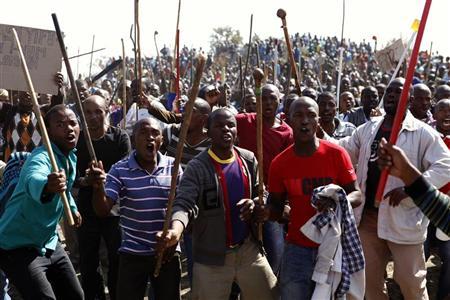By Sherilee Lakmidas
MARIKANA, South Africa (Reuters) – South African police fired tear gas and rubber bullets on Wednesday to disperse protesters near a mine run by the world’s biggest platinum producer Anglo American Platinum, as unrest spread after strikers at rival Lonmin won big pay rises.

Within hours of Lonmin agreeing pay rises of up to 22 percent, workers at nearby mines called for similar raises, spelling more trouble after six weeks of industrial action that claimed more than 40 lives and rocked South Africa’s economy.
The death toll from the unrest rose to 46 when a woman struck by a rubber bullet when police had dispersed mine protesters at the weekend died in hospital on Wednesday, Central Methodist Church Bishop Paul Verryn, who has been counseling striking miners, told Reuters.
“We want management to meet us as well now,” an organiser for the militant Association of Mineworkers and Construction Union (AMCU) at Impala Platinum, the second biggest platinum producer, told Reuters.
“We want 9,000 rand a month as a basic wage instead of the roughly 5,000 rand we are getting,” said the organiser, who declined to be named fearing recriminations from the firm.
Jubilant workers at Lonmin’s Marikana mine, 100 km (60 miles) northwest of Johannesburg, painted the wage deal as a victory for AMCU over the dominant National Union of Mineworkers (NUM), an ally of the ruling African National Congress.
President Jacob Zuma expressed relief at the pay deal after intense criticism from the opposition and media of the government’s handling of the crisis – not least in the aftermath of the police killing of 34 Marikana miners on August 16.
The shootings, the bloodiest security incident in democratic South Africa’s 18-year history, boosted an “Anyone but Zuma” campaign dividing the ANC, although he remains favourite to win an internal leadership election in December.
The violence rekindled memories of apartheid-era clashes when police representing white-minority rulers fired on masses of blacks seeking freedom. This time it was the ANC government’s police, black and white, who shot the workers, all black.
REALITY OF EXTRA COSTS
Lonmin shares rose more than 9 percent in early trade on news of the pay deal, but gave up most of those gains as the reality of the extra costs to a company struggling with a shaky balance sheet and unprofitable mine shafts sunk in.
The wage deal could add 13 percent to the group’s recurrent costs, plus an additional $10 million for a one-off back-to-work bonus, Nomura said in a note.
Police clashed with a crowd of men carrying traditional weapons such as spears and machetes in a township at a nearby Anglo American Platinum (Amplats) mine outside the city of Rustenburg.
Officers fired tear gas, stun grenades and rubber bullets to disperse an “illegal gathering”, police spokesman Dennis Adriao said. He had no information on any injuries.
A labour activist said workers who had stayed off the job at Amplats, which accounts for 40 percent of global supplies of the metal used for catalytic converters in cars and jewellery, were inspired by Lonmin and would press on with their demands.
“The mood here is upbeat, very celebratory,” Mametlwe Sebei, a community representative near Rustenburg, said. “Victory is in sight. The workers are celebrating Lonmin as a victory.”
Platinum prices rose a little on Wednesday after falling 2.6 percent a day earlier on news of the Lonmin deal.
At Marikana, strikers celebrated the deal as a triumph for AMCU, which exploded onto the labour scene in January when its turf war with the NUM led to a six-week closure of the world’s largest platinum mine, run by Implats.
Thousands of workers and their families gathered at a soccer pitch near the mine to sing victory songs and denounce NUM and its politically aligned leaders.
“AMCU is coming. We told them and they are coming,” one of the chants ran. One banner read: “Death Certificate; first name: NUM; cause of death: corruption”.
“I am happy now,” 42-year-old rock-driller Simphiwe Booi said. “Now we can eat.”
MAKING ENDS MEET
The 100-year-old ANC was born out of South Africa’s fight against apartheid, and rejected the exploitation of poor black miners toiling in the country’s fabled gold reefs and other mineral deposits.
Nelson Mandela’s ANC promised a better life for all when it took power with the end of apartheid in 1994.
But despite billions of dollars spent on infrastructure, housing, healthcare and education, income disparity and unemployment have mushroomed while chronic joblessness has helped entrench a massive underclass.
While mineworkers have seen their wages steadily increase over the years and mining firms have built schools, hospitals and roads to help communities around shafts, many of the 500,000 people in the sector still have trouble making ends meet.
Economists were sanguine at the pay deal, saying Lonmin may have set a precedent for elevated wage settlements that could spread beyond mining and through an economy already saddled with globally uncompetitive labour costs.
“The ripple effects will continue to be felt. The outcome of the negotiation at Marikana will likely set a new benchmark for mining more generally and wage costs are set to rise substantially,” JP Morgan said in a research note.
Should lofty wage hikes take root, they would also be likely to stoke wider inflation and curb the central bank’s ability to cut interest rates to boost anaemic economic growth.
“This can move into the rest of the economy,” said Absa Capital strategist Michael Keenan. “It sets a very high precedent for the rest of the market.”
The gold sector has also not been spared, with 15,000 miners at the KDC West operation of Gold Fields, the world’s fourth largest bullion producer, on an illegal strike.
Gold Fields’ chief executive Nick Holland told Reuters on Tuesday his company could “go on for quite some time” despite the KDC West disruption.
Amplats and Implats shares were down 0.8 percent and 1.4 percent respectively at 1301 GMT.





